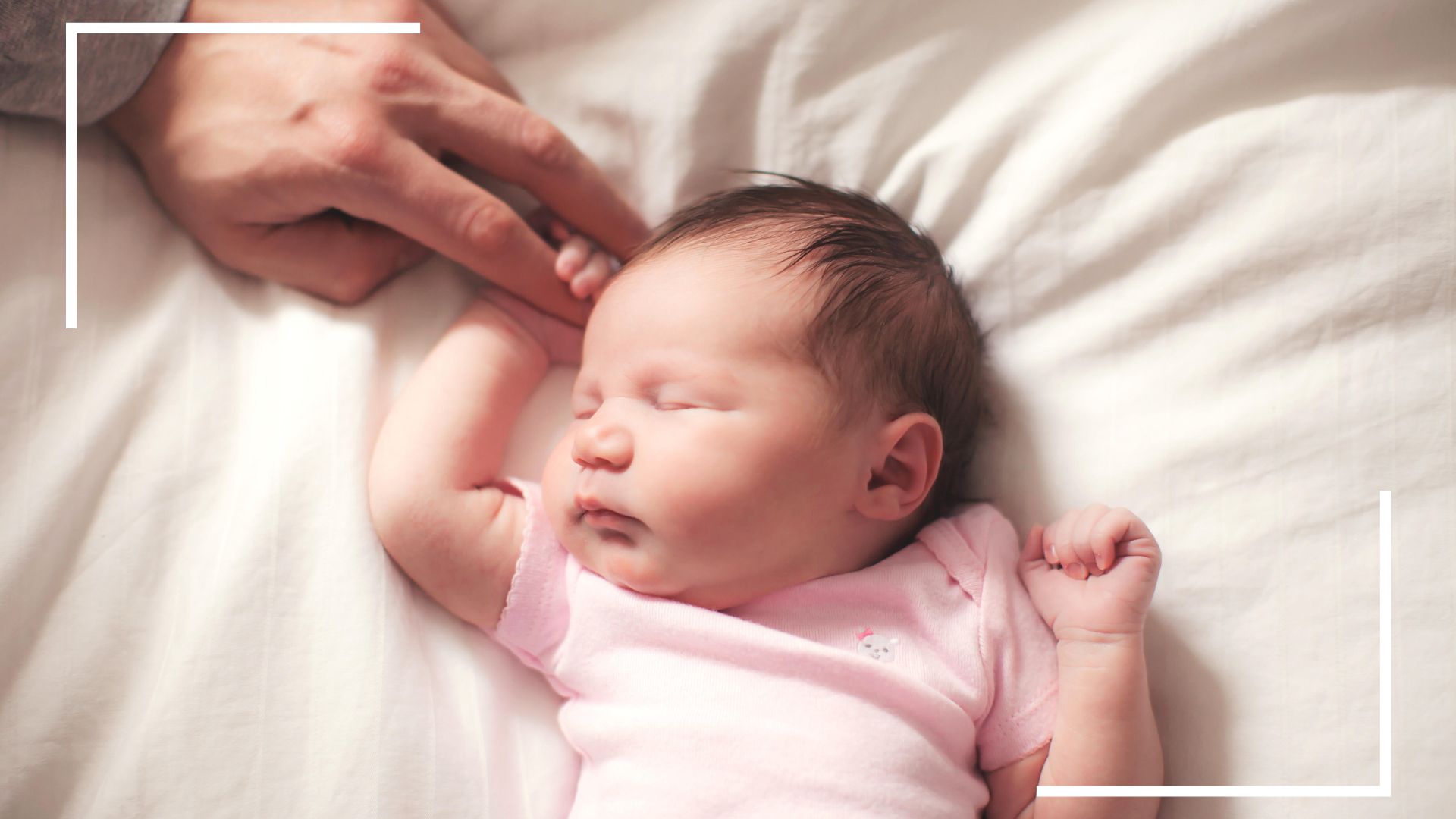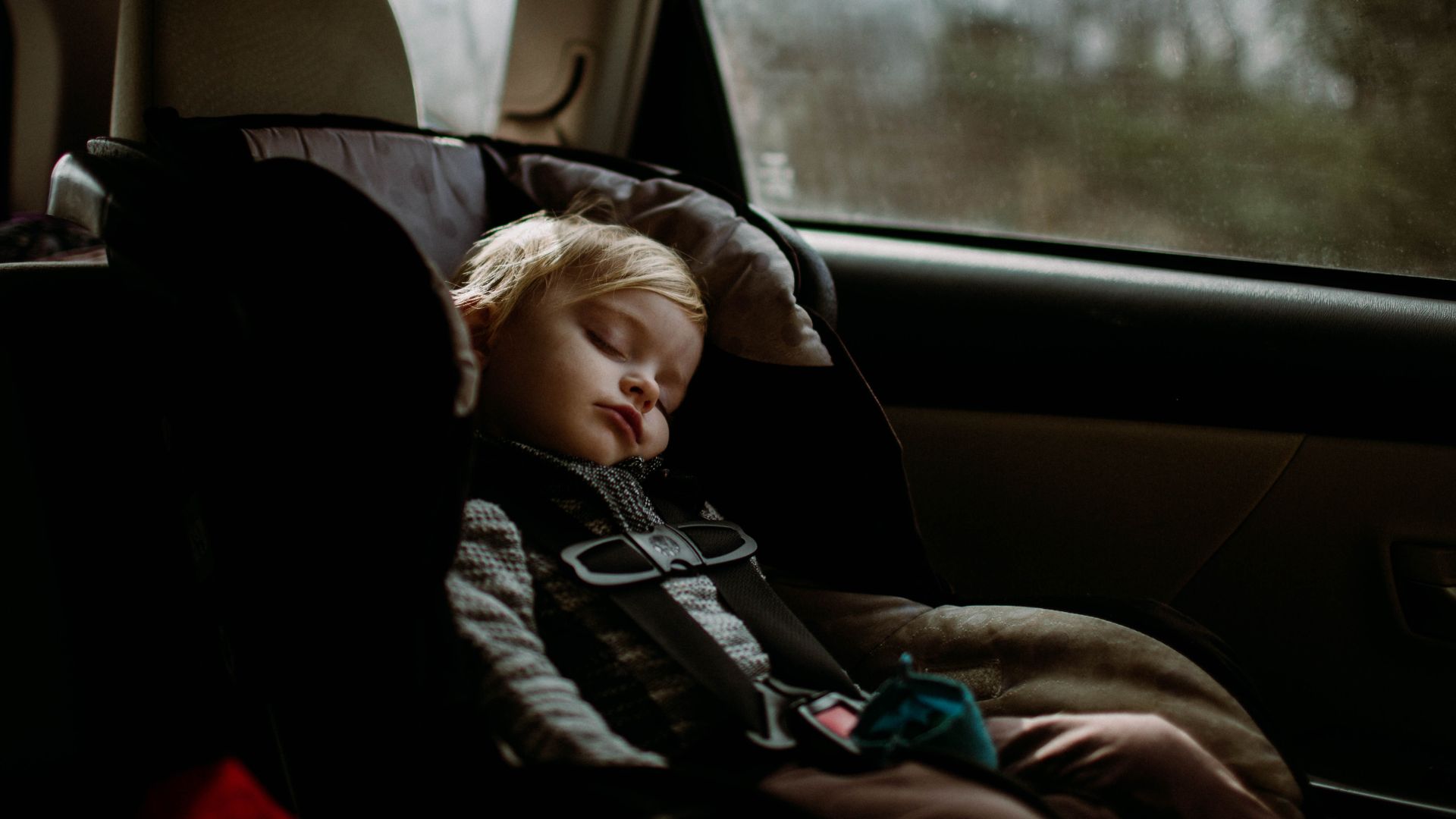When do babies sleep through the night? Two baby sleep experts reveal all
“When do babies sleep through the night?” is a big question for many parents. Find out how you can help your little one to settle more easily.


When do babies sleep through the night? must be one of the most-asked questions among new parents. And when you’re exhausted it may feel that everyone else's baby is the 'perfect sleeper'. But most babies don’t sleep through the night, so you're not alone.
Whether you've invested in the best cot mattress, or an amazing white noise sleep aide, sleeping through until morning is one of the big baby development milestones that most parents look forward to, if your baby is not sleeping through you are not a failure, and your baby isn't broken, they're not supposed to sleep through, we actually all wake up during the night, it's just that babies need help dropping back off to sleep.
Infant sleep consultant Rosey Davidson, the author of The Just Chill Baby Sleep book, agrees. She tells us: “In theory, no one sleeps through the night. We all go through sleep cycles, between light and deep sleep. Babies are no different. What we tend to mean when we say a baby 'sleeps through,' is that they sleep for a long chunk of the night without parental input or milk feeds. Every baby is different. Some will naturally do this in the early weeks, and some won't do it until toddlerhood, or even childhood.”
All very true, though there are some steps you can take to ensure your little one is set up to have the best night’s sleep they can. We talk to the experts to make this challenge a tiny bit easier.
When do babies sleep through the night?
According to the NHS, between 6 to 12 months is when babies will “sleep for up to 12 hours at night”. However, we talk to baby sleep experts who agree that it could be toddlerhood or childhood before your little one manages to sleep through the night, completely unaided.
Like adults, babies naturally wake during the night. The difference seems to be how easy they find it to settle themselves back to sleep. Baby sleep expert and author Rosey Davidson explains: “Temperament plays a big part. Some babies are naturally less likely to call out for their parent’s help to get back to sleep. As parents, we can also set them up for the best chance at a more settled night by working on an age-appropriate daytime routine and sustainable ways of settling them to sleep at bedtime and during the night.”
It's also important to remember that different parents will have different ideas of what ‘sleeping through’ means. A study by the American Academy of Pediatrics shows that of 757 babies aged either 6 or 12 months found that 27.9% to 57.0% of 6 and 12-month-old infants did not sleep through the night (defined as either 6 or 8 hours of uninterrupted sleep).
Parenting advice, hot topics, best buys and family finance tips delivered straight to your inbox.
Audrey, who has a 12-month-old daughter, Beatrice, said: “My best friend kept telling me how her baby was sleeping through every night. I found it difficult to hear, as I was so sleep deprived and emotional. But one day she mentioned in passing that she meant her baby slept for six hours at a time. That made me feel so much better, as I realised what we were going through was totally normal."

Rosey is an infant Sleep Consultant, mum of three, NSPCC Campaigner for Childhood, and founder of Just Chill Baby Sleep site. She is passionate about demystifying sleep information and empowering parents to become their child’s sleep expert.
Typical sleep patterns by age group
Typical sleep patterns by age group vary greatly as a baby gets older. When babies are first born they spend most of their day sleeping. However, by the age of 1, they will be getting most of their sleep at night, with just one or two naps in the day. Baby and child sleep coach Nicole Ratcliffe, who is the founder of Baby2Sleep, tells us: “Every baby is different so there is no way to say when a baby will sleep through. I have spoken to parents who have said their baby 'slept through' from two weeks old. However, it is important to understand that each parent’s version of sleeping through can be different.”
Newborn - 6 months
Nicole explains: “Newborn babies have a very different sleep structure to 6 month old babies. Newborn babies tend to have no circadian rhythmicity when born and it takes until around 12 weeks old to emerge fully. They are also missing two stages of their NREM (non-rapid eye-movement) sleep, and this is important as we are designed this way to help both physical growth and brain development. If we try to 'force' a baby to sleep through before they are biologically ready, it can become a SIDS (sudden infant death syndrome) risk.”
For the first few months be prepared for your little one to take frequent naps, especially if you are doing something which is mentally tiring, such as attending a group. Also remember that the younger the baby, the more likely they are to be feeding during the night.
Rosey says: “Between 0 to 3 months most babies sleep 14 to 17 hours within 24 hours, averaging 4 to 5 naps.” As your baby gets older you will start to develop more of a routine and find that they often nap at a particular time of the day.

Nicole Ratcliffe, is a member of the International Association of Child Sleep Consultants, and trained with British paediatric Sleep Society. She is also the founder of Baby2Sleep and mum of two beautiful and much-loved daughters. Nicole offers you and your family the chance to bring sleep back into your home. This in turn gives you the chance to build on your relationship again, and get some well deserved me time.
6 months - 12 months
Nicole explains: “By 6 months old, babies tend to have more structure and a more regular sleep pattern. Between 6 and 8 months sleep tends to average 11 hours overnight with 3.5 hours during the day over 3 naps, and by 9 months this tends to drop to 3 hours over 2 naps.
Once your baby nears the 12 months mark they will need less sleep during the day. Rosey says: “By 10 to 18 months most babies sleep 11 to 14 hours in 24 hours, averaging 1 to 2 naps.” Through the baby’s first year, it is normal for them to wake up frequently. In this study of 5,700 children, 8 out of 10 parents of both three-month-olds and eight-month-olds told researchers that their babies woke more than five nights a week.
12 months +
However, as they got older this changed. By 18 months old almost two-thirds of babies no longer needed resettling at night. This is also around the time that babies will often start to change their nap routine.
Lucy, a mum to two-year-old Ava, says: “At around 18 months old Ava dropped to just one nap a day and we noticed a huge difference in her nighttime sleeping. She went from crying for us most nights to only once or twice a week.”
Nicole says: “Between 15 and 18 months, babies start to transition from two naps a day to one nap of around 2 to 2.5 hours, still with around 11 hours overnight.
“However, it is important to note that these are averages. There are some high and low sleep needs babies. But, as an average, they tend to sleep a certain amount in a 24-hour period and this could be split differently over day and night for each baby.”
"My best friend kept telling me how her baby was sleeping through every night. I found it difficult to hear... one day she mentioned that her baby slept for six hours at a time. That made me feel so much better."
Audrey
Should I let my baby sleep through the night?
If there are no concerns about their weight then it is fine to let your baby sleep through the night. You only need to wake them at night to feed if they are not taking in enough calories during the day. Don’t forget to always follow advice from the NHS and The Lullaby Trust to sleep your baby on their back to reduce the risks of SIDS (sudden infant death syndrome).
Nicole says: “In the very early stages, if your newborn baby appears to not want to wake for feeds, then you may need to intervene to make sure your baby is getting enough calories over those 24 hours. "After a couple of weeks, if there are no issues with your baby's growth and you haven't specifically been asked to wake to feed, it is fine to feed upon waking in a responsive manner.”
Rosey agrees: “Once your baby has regained their birth weight, and there are no other health or feeding concerns you can let them sleep as long as they want at night. "Your midwife or paediatrician will be monitoring your baby's weight in the early weeks. Some babies will naturally start sleeping for longer chunks of time, and others will need a bit of help for longer.”
What else could prevent baby from sleeping longer through the night?
- Daytime naps
- Temperature
- Separation anxiety
- Hunger
- Sleep regressions
There are a number of things that could be preventing your baby from sleeping longer through the night. Although it is natural for babies to wake up, you can also ensure that they have the best night possible by making sure they are ready for bedtime when it comes and that they remain comfortable while sleeping.
Daytime naps
Babies need to get a certain amount of sleep over a 24-hour period. So if your little one is waking up a lot at night, it is worth considering how much they are napping during the day. Rosey says: “In order to give our babies the best chance at sleeping for longer chunks at night, we should consider their daytime sleep. Babies need to nap during the day, but if they nap too much, or too late it will impact their nighttime sleep negatively.
"Also if they don't nap when they need to, they can become agitated and harder to settle. We should look at overall sleep requirements across 24 hours, and also take into account that each baby is slightly different. Some will need longer naps than others. It is all about finding a happy medium when it comes to naps.”
Rob, who has an eight-month-old daughter Bella, says: “A couple of months ago we realised that when Bella slept after 3pm she always took a long time to get to sleep at bedtime and woke multiple times during the night. We decided to have her lunchtime nap as the last one of the day and have found that she now sleeps so much better at night.” When and where your baby naps can also have an impact on their sleep patterns.
Nicole explains: "It could be that your baby has started nursery and they aren't able to accommodate your baby's sleep needs. As an example, I speak to a lot of parents who find sleep falls apart when their baby turns one. But this tends to be because it suits the nursery schedule to put babies this age onto one nap a day at lunchtime, which for most babies is too young. So they go home at the end of the day extremely overtired.
"Parents may end up feeling stressed because their baby falls asleep in the car on the way home and they end up with a bedtime battle. Or they are extremely wired or cranky and then the sleep battles begin."

Temperature
When considering nighttime waking, it is also worth thinking about the temperature your baby is sleeping at. Being too hot or too cold can also cause them to wake up. Rosey says: “They should be appropriately dressed for the temperature, 16 to 20 degrees is optimum. Overheating can be a SIDS risk and can make our babies unsettled. Being too cold can also mean that baby is uncomfortable.”
Different babies will also require different comfort levels at night; some learn to self-soothe more quickly than others. In fact, this study of 80 babies over 4 nights found that the number of night wakes did not change over the first year. However, older babies were more likely to self-soothe and parents did not take older children out of their cots as much as younger ones.
Mum-of-one and Family Editor at Goodto.com relied on her GroEgg when her son was tiny she tells us; "Ted was a NYE baby, so I was terrified he was cold or I was overheating him, the egg gave me some loose guidance in the early days which was hugely welcomed."
Separation anxiety
Some babies may suffer from separation anxiety, particularly if they spend the majority of their day with one parent. Nicole says: “If you think separation anxiety is partly to blame for poor sleep, playing games such as peekaboo can really help babies learn that just because they can't see you, it doesn't mean you aren't there and that you always return.”
Rosey adds: "How babies settle at bedtime can also affect how the night goes. Working on how our babies fall asleep can mean that they learn how to fall back to sleep without our assistance when they stir between sleep cycles during the night.
"It is entirely normal and natural to attend to our babies during the night, but we can gently work on strategies to help them to fall back to sleep in a sustainable way for the family, and baby in question."
Hunger
Another factor that can cause babies to wake in the night is hunger. Studies have shown that breastfed babies often wake up more. So don't worry if you find that to be the case.
Nicole says: "Introducing a dream feed before you go to bed can potentially give you a good few hours of sleep before your baby wakes up needing a feed. This would also help you understand whether your baby is waking with hunger or for something else."
Sleep regression
It’s also important to remember that babies are learning so much every day and sometimes as they reach different developmental milestones their sleep can be affected. Nicole says: "You may have heard of the term 'sleep regression', but I like to call it 'brain development'. Babies are developing so fast that sometimes sleep takes a back seat while the brain and body are trying to process all the new changes.
"At 4 months, sleep cycles are maturing, babies are becoming more alert and interested in the world around them, and they may begin rolling amongst a number of other things. Around 8 months, babies may start to crawl, around 10 months they may start standing and around 12-18 months babies start walking. These gross motor skills play havoc with sleep while the brain and body adjust."
So, while "When do babies sleep through the night?" may be a question you wail out in the early hours, rest assured it will happen eventually and every child works on their own timeframe. And remember, no matter how tired you are, do not be tempted to lay your baby on its front to promote deeper sleep, as studies have shown that this increases the risk of SIDS.
However, if you are really concerned that your baby is waking too frequently or if lack of sleep is beginning to impact your mental health then do make sure you reach out to your GP or midwife.
If you’re trying to develop good sleep routines and are looking for a comfy cot, check out our best cot mattresses guide. Plus the SnuzCloud Baby Sleep Aid could help you to create a good bedtime routine. And if you’re looking for a cool sleeping bag for the summer or holidays, check out this aden + anais Baby Sleeping Bag Review.
Video of the Week:

Emily-Ann Elliott is an experienced online and print journalist, with a focus on health, travel, and parenting. After beginning her career as a health journalist at The Basingstoke Gazette, she worked at a number of regional newspapers before moving to BBC News online. She later worked as a journalist for Comic Relief, covering stories about health and international development, as well as The Independent, The i, The Guardian, and The Telegraph. Following the birth of her son with neonatal meningitis, Emily-Ann has a particular interest in neonatal health and parental support. Emily-Ann has a degree in English literature from the University of Newcastle and has NCTJ and NCE qualifications in newspaper journalism.